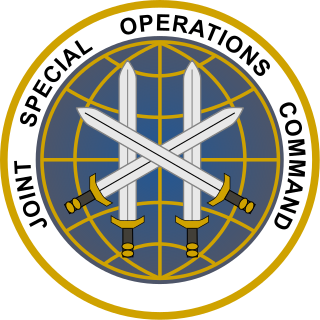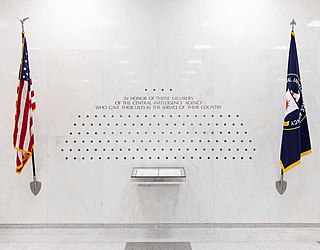
The Defense Intelligence Agency (DIA) is an intelligence agency and combat support agency of the United States Department of Defense, specializing in defense and military intelligence.

George John Tenet is an American intelligence official and academic who served as the Director of Central Intelligence (DCI) for the United States Central Intelligence Agency, as well as a Distinguished Professor in the Practice of Diplomacy at Georgetown University.

The director of central intelligence (DCI) was the head of the American Central Intelligence Agency from 1946 to 2004, acting as the principal intelligence advisor to the president of the United States and the United States National Security Council, as well as the coordinator of intelligence activities among and between the various US intelligence agencies.

Joseph Charles Wilson IV was an American diplomat who was best known for his 2002 trip to Niger to investigate allegations that Saddam Hussein was attempting to purchase yellowcake uranium; his New York Times op-ed piece, "What I Didn't Find in Africa"; and the subsequent leaking by the Bush/Cheney administration of information pertaining to the identity of his wife Valerie Plame as a CIA officer. He also served as the CEO of a consulting firm he founded, JC Wilson International Ventures, and as the vice chairman of Jarch Capital, LLC.

The Special Activities Center (SAC) is a division of the United States Central Intelligence Agency responsible for covert and paramilitary operations. The unit was named Special Activities Division (SAD) prior to 2015. Within SAC there are two separate groups: SAC/SOG for tactical paramilitary operations and SAC/PAG for covert political action.

The Niger uranium forgeries were forged documents initially released in 2001 by SISMI, which seem to depict an attempt made by Saddam Hussein in Iraq to purchase yellowcake uranium powder from Niger during the Iraq disarmament crisis. On the basis of these documents and other indicators, the governments of the United States and the United Kingdom asserted that Iraq violated United Nations sanctions against Iraq by attempting to procure nuclear material for the purpose of creating weapons of mass destruction.
Howard Phillips Hart was an American Central Intelligence Agency officer. He worked as the CIA chief of station in Islamabad, Pakistan from May 1981 until 1984. He was succeeded by William Piekney in the summer of 1984. He died on April 30, 2017.

The Joint Special Operations Command (JSOC) is a joint component command of the United States Special Operations Command (USSOCOM) and is charged with studying special operations requirements and techniques to ensure interoperability and equipment standardization, to plan and conduct special operations exercises and training, to develop joint special operations tactics, and to execute special operations missions worldwide. It was established in 1980 on recommendation of Colonel Charlie Beckwith, in the aftermath of the failure of Operation Eagle Claw. It is headquartered at Pope Field.

The Intelligence Star is an award given by the Central Intelligence Agency to its officers for "voluntary acts of courage performed under hazardous conditions or for outstanding achievements or services rendered with distinction under conditions of grave risk". The award citation is from the Director of the Central Intelligence Agency and specifically cites actions of "extraordinary heroism". It is the third-highest award given by the Central Intelligence Agency, behind the Distinguished Intelligence Cross and Distinguished Intelligence Medal, and is analogous to the Silver Star, the US military award for extraordinary heroism in combat. Only a few dozen people have received this award, making it one of the rarest valor awards awarded by the US government.
Tyler Scott Drumheller was an American Central Intelligence Agency (CIA) officer who served during the Cold War and early War on Terror, advancing to chief of the European division for clandestine operations in the Directorate of Operations from 2001 until his retirement in 2005. He later became known for exposing the Bush White House's use of intelligence from Curveball, an unreliable Iraqi intelligence source managed by the German BND, to mislead policymakers and the public in the lead up to the 2003 invasion of Iraq.

The Central Intelligence Agency (CIA), known informally as the Agency, metonymously as Langley and historically as the Company, is a civilian foreign intelligence service of the federal government of the United States tasked with gathering, processing, and analyzing national security information from around the world, primarily through the use of human intelligence (HUMINT) and conducting covert action through its Directorate of Operations. The agency is headquartered in the George Bush Center for Intelligence in Langley, Virginia.
Hassan Ghul, born Mustafa Hajji Muhammad Khan, was a Saudi-born Pakistani member of al-Qaeda who revealed the kunya of Osama bin Laden's messenger, which eventually led to Operation Neptune Spear and the death of Osama Bin Laden. Ghul was an ethnic Pashtun whose family was from Waziristan. He was designated by the Al-Qaida and Taliban Sanctions Committee of the Security Council in 2012.

Michael George Vickers is an American defense official who served as the Under Secretary of Defense for Intelligence (USD-I). As USD-I, Vickers, who was appointed by President Barack Obama in 2010, was the Defense Department's top civilian military intelligence official. Before becoming USD-I, Vickers served as Assistant Secretary of Defense for Special Operations and Low Intensity Conflict.
The United States (U.S.) Central Intelligence Agency (CIA) has been involved in covert actions and contingency planning in Iraq ever since the 1958 overthrow of the Iraqi monarchy, although the historiography of Iraq–United States relations prior to the 1980s is considered relatively underdeveloped, with the first in-depth academic studies being published in the 2010s.
The Central Intelligence Agency (CIA), a United States intelligence agency that "provides objective intelligence on foreign countries", also informally referred to as the Agency. The CIA is part of the United States Intelligence Community, is organized into numerus divisions. The divisions include directors, deputy directors, and offices. The CIA board is made up of five distinct entitles called Directorates. The CIA is overseen by the Director of Central Intelligence. Under the Director of Central Intelligence is the Deputy Director of Central Intelligence. Under this the CIA is divided into four directorates. These directorates are as follows:

Robert James Woolsey Jr. is an American political appointee who has served in various senior positions. He headed the Central Intelligence Agency as Director of Central Intelligence from February 5, 1993, until January 10, 1995. He held a variety of government positions in the 1970s and 1980s, including as United States Under Secretary of the Navy from 1977 to 1979, and was involved in treaty negotiations with the Soviet Union for five years in the 1980s. His career also included time as a professional lawyer, venture capitalist and investor in the private sector.

The Defense Clandestine Service (DCS) is an arm of the Defense Intelligence Agency (DIA), which conducts clandestine espionage, intelligence gathering activities and classified operations around the world to provide insights and answer national-level defense objectives for senior U.S. policymakers and American military leaders. Staffed by civilian and military personnel, DCS is part of DIA's Directorate of Operations and works in conjunction with the Central Intelligence Agency's Directorate of Operations and the U.S. military's Joint Special Operations Command. DCS consists of about 500 clandestine operatives, which is roughly how many case officers the CIA had in the early 2000s before its expansion.

The Secret Intelligence Service (SIS), commonly known as MI6, is the foreign intelligence service of the United Kingdom, tasked mainly with the covert overseas collection and analysis of human intelligence on foreign nationals in support of its Five Eyes partners. SIS is one of the British intelligence agencies and the Chief of the Secret Intelligence Service ("C") is directly accountable to the Foreign Secretary.

The United States Central Intelligence Agency (CIA) dates from September 18, 1947, when President Harry S. Truman signed the National Security Act of 1947 into law. A major impetus that has been cited over the years for the creation of the CIA was the unforeseen attack on Pearl Harbor, but whatever Pearl Harbor's role, at the close of World War II government circles identified a need for a group to coordinate government intelligence efforts, and the Federal Bureau of Investigation (FBI), the State Department, the War Department, and even the Post Office were all jockeying for that new power.













